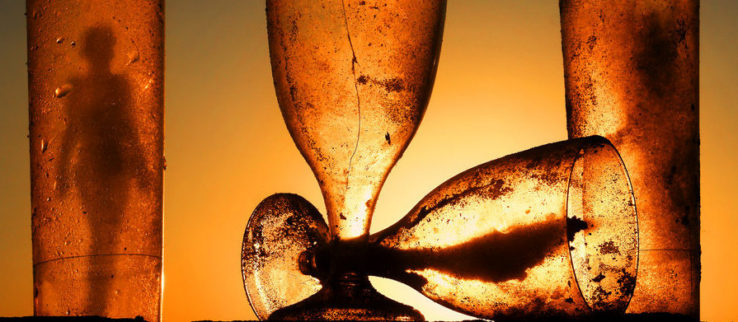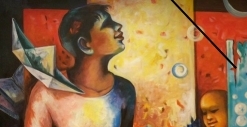I’m an empty vessel. There is nothing inside me that is unique. My aspirations are ordinary for my generation. My views on life are shaped by the people around me. The closer I look at myself, the less I find. So who am I?
Buddhists say there is no “self”, that it’s just an illusion. Maybe. But many concepts in the human culture are illusive. Justice, nation – they aren’t any more real than “self”. And yet they exist in a very real sense. If there is an illusion we should be talking about, it’s the illusion of the “a priori special self”. I’m special because I’m Jewish. I’m special because I believe in marriage equality. Really?
The external circumstances of our birth and life, our beliefs and our values don’t make us unique, and they shouldn’t make us proud. The idea that people, or groups of people may have some essence that makes them “who they are” is long overdue. Often you hear people say “yes, he did something bad, but he is a good person inside”. This is just absurd.
There is no concrete nature to me. I’m only as good as I do good. As Sartre argued, human beings aren’t tables. A table has a concrete nature – it’s made from wood, it has four legs and it’s used to serve a lunch on. Human beings, on the other hand, don’t have a prescribed nature that makes them who they are. Unless we want to equate ourselves to innate objects, we shouldn’t be talking about a unique essence of our beings.
Hold your horses. I’m not saying we are all born “tabula rasa”, or that we all have a total freedom to become whoever we want, as existentialists often argued wrongly. We are affected by our genes, as conservatives tell us. And we are shaped by our life experiences, as liberals remind us. But to stretch the metaphor, these shape the size of our vessels, rather than its contents. Sure, if we are born with a debilitating disease or come from a broken home, our vessel is inherently small. But some people in these circumstances still manage to pour more into it, than people from privileged backgrounds.
Whatever is our number in the gene lottery, and whatever circumstances life throws at us, it’s our job to pour contents into the vessels of our lives by fulfilling a potential, big or small. Notice – I’m talking about a potential, one of multiple possibilities that we can realize, not the potential, a unique and singular destiny that supposedly waits to unfold. A potential itself doesn’t mean much. A pot is an ordinary thing, until someone plants a flower in it.
What use is our good voice, if we haven’t developed it? What use are our values, if we haven’t exercised them? The only way to be good is to do good. The only way to be someone is to do something. That doesn’t mean that success is what determines who we are. You can fail in everything you do, and still touch people and make their life better.
In Ingmar Bergman’s Winter Tale, a priest is chased by the horrors of war he witnessed as a young man. But instead of wrestling with his doubts and come to terms with what it means for his faith, he compartmentalizes it. He makes God into an escapist fantasy, isolated from the hardships of the real world. When a fisherman comes to talk with him and tells him of his existential anxiety and a deep feeling of meaninglessness, he can’t help him, besides offering a few platitudes. In that moment, he could have engaged the man, make a human contact, talk with him heart to heart, and at least for one day be more than just a disillusioned shadow of a priest. But instead he remains on his pedestal, distant and cold. The fisherman kills himself and the priest remains the same empty shell, losing a chance to redefine himself.
Dozens of plans, undeveloped ideas, values and beliefs kept in a safe place – they all don’t mean much in terms of “who we are”. No amount of books, movies, travels or people can fill this great emptiness of ours. We are empty of meaning, but so is the world, an indifferent and chaotic place it is. The only thing left is to contain this meaninglessness and produce meaning by acts of compassion and care, as small as they come.
The ideal we should strive to is a creature who takes more of the world (and it’s meaninglessness) into himself and develops new forms of courage and endurance (Paul Tillich)
Children psychologists say that we are greatly affected by the amount of love we receive from our parents as children. So don’t they “fill our vessels” with their love? Actually not. It’s precisely because we received enough love as children, that we can stay open and receptive to the world. Otherwise we would be filled with anxiety, neediness, and fear – hardly an “empty vessel”. Loving, gentle parents don’t pour contents into their children’s selves – instead they preserve and nurture their openness, curiosity and ability to change and grow.
Even as I write this post, in this moment, I’m empty. The ideas and words that slowly fill the page are not inside me – they float around and I pick those that suit me. In a way, it’s not me who shapes these words into a narrative, it’s the narrative that shapes me. When the post will be finished, I’ll know who I am. I’ll be the one who wrote it. No more and no less.



I like to think of myself as infinite rather then empty …. able to contain all deeds, identities,encounters, past and future of humanity and the univerce .
That’s interesting. When you say “able to contain”, does it mean that you feel that you actually contain all that diversity, or the potential to be many of those things? If it’s the second, than it’s similar to what I’m saying here.
The universe is both, (almost) infinite and (almost) empty. In reflecting the universe in us, I see emptiness (that can be filled), while you see infinity (that can be explored). Maybe those are just different ways to express the fluidity of our persons.
Mike, it has been a while for me since reading one of your posts. What you said about us receiving love as children does help us to be emotionally stable(my words) adults is correct. Yet, these are as the Bible says ‘critical times hard to deal with”- 2 Timothy 3:1-5
So it is no wonder that the strong and not so strong is feeling ’empty’ at times.
Mike, I will most like read this post again to digest more of your thoughts on this matter, so to speak. -Nice job and kind regards, James
Hi James, Love is definitely central in becoming persons. But only in making choices and doing something, can we fill the empty vessels of our being with contents.
Anyway, it’s good to hear from you 🙂
Hi.
I was born into a Protestant family in New Jersey. At age 33, became an orthodox Jew. Now Hareidi and living in Eretz Yisroel.
Was thinking of my early existence as an “empty vessel,” raised by two very loving parents who were opposed to racism. Unitarian, if you know what that is.
I had a lot of good ingredients, some not so good instincts, but now I have a structure and guideposts that, increasingly, orchestrate it all.
There’s man’s search for meaning, and man’s search for internal integrity.